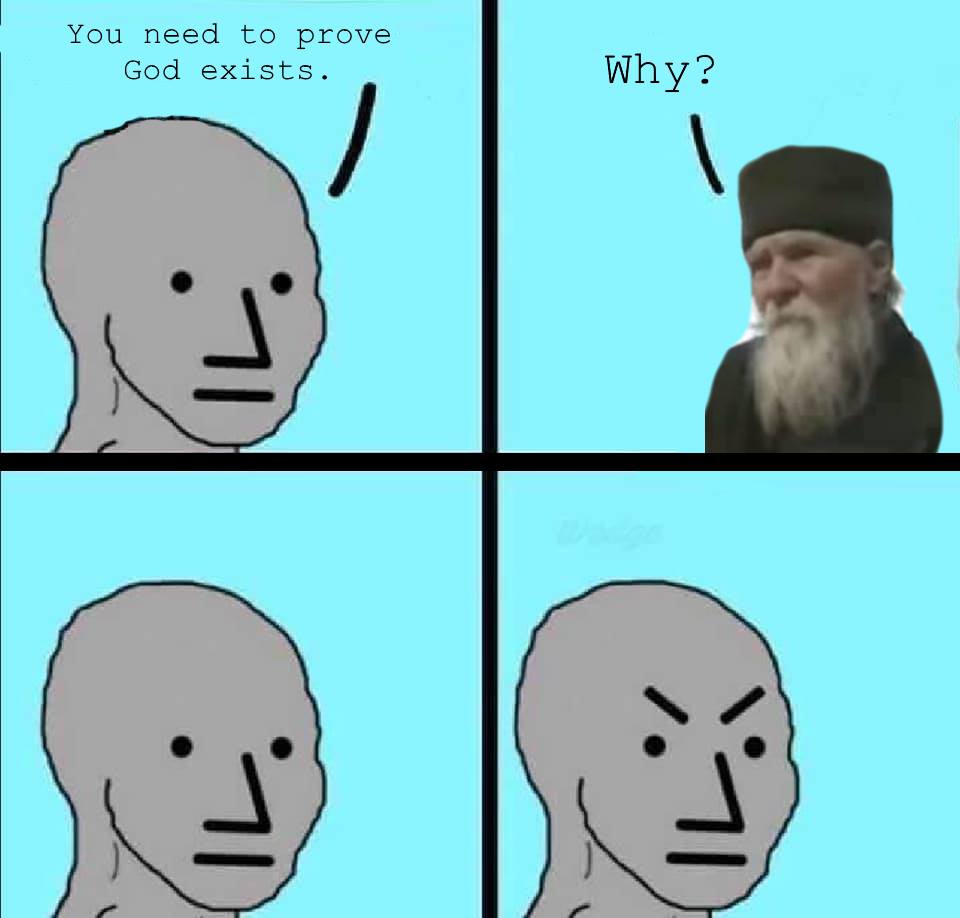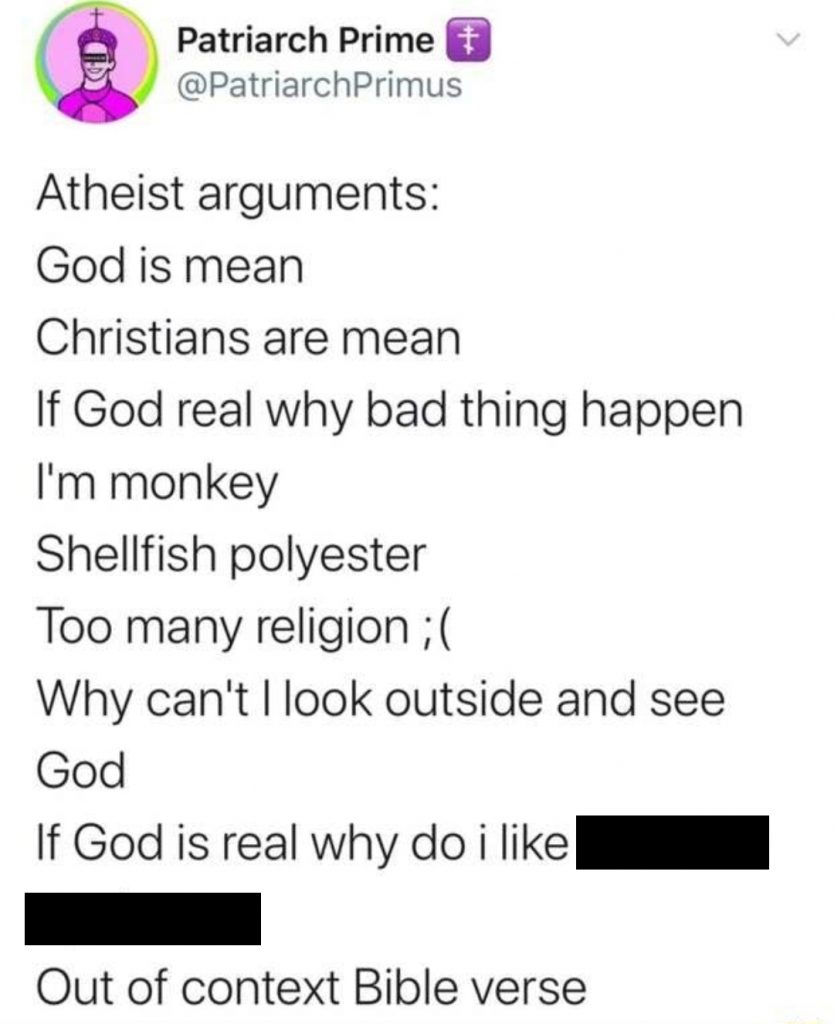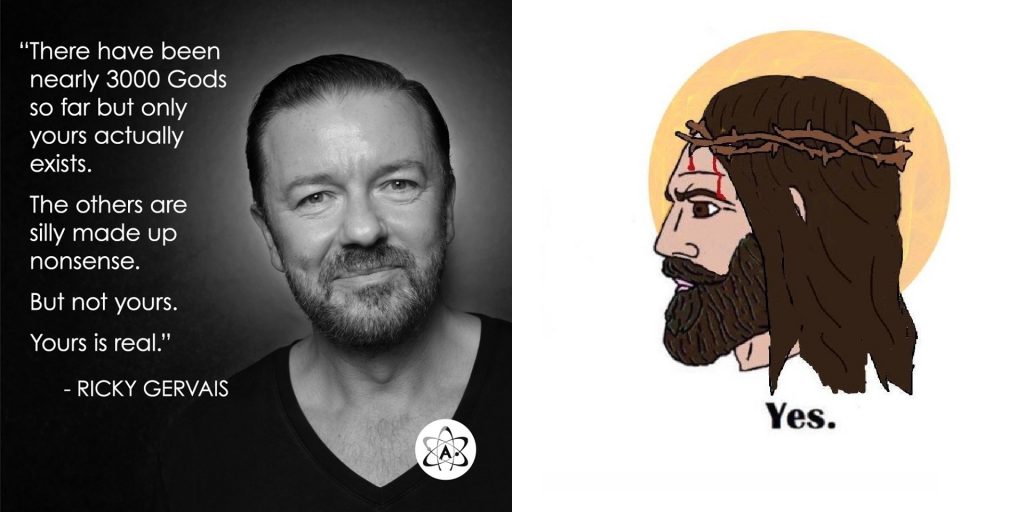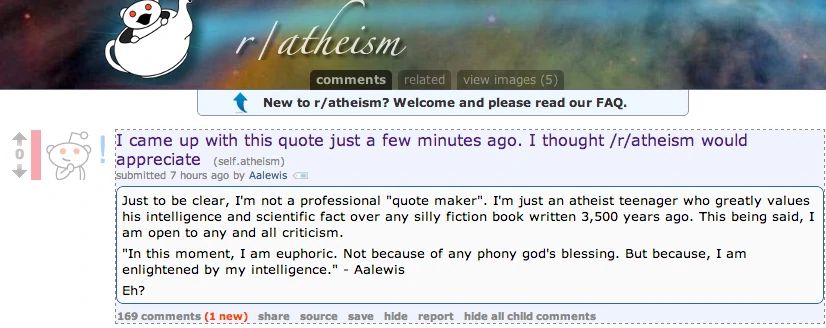The Fall of a Man
When I was a boy, I always had a mathematical mind. From as early as I can remember I found the great mysteries of the universe utterly fascinating, learning the names of the planets of the solar system at two years old, and taking an interest in chemistry before I even took pre-algebra. Over the years, I built my identity around these hobbies, often gaining a reputation as the go-to kid for homework help (or a quick sideways glance during a quiz). This reputation quickly blew up my ego. The more I was asked for help in math or science classes, the more my identity as the self-proclaimed “smart kid” festered. I cruised through honors classes and drew the ire of many a teacher who knew I had great potential but squandered it by blowing off homework to play video games. After all, I could do just fine in classes by scoring high on tests. Why should I bother working hard or striving to make something of myself? There was always high school or college for that.
A few years down the line a good friend of mine in middle school introduced me to Reddit, a social media aggregation site with countless communities dedicated to various topics. My mind was blown; the sheer amount of content available had me reeling. I was immediately consumed, spending hours and hours scrolling down page after page, from cat pictures to game highlights to questionable philosophy. It was the last of these that caught my attention, and sent me on a path into (and eventually through) one of the greatest online fad movements, that of New Atheism.
Some quick background: New Atheism, also referred to as militant atheism, is a broad term describing a common school of thought within 21st century atheism. Generally, it holds that religion is not just something to be tolerated but to be actively and forcefully stamped out, treated as a blight upon society. As opposed to “classical” atheism, it takes on a sort of anti-theism. Some prominent thinkers of this school include Richard Dawkins, an evolutionary biologist and anti-religious author; the late Christopher Hitchens, a political and anti-theist author; and Sam Harris, a neuroscientist whose criticism of religion has focused especially on Islam. It generally organizes on forums like Reddit, but has bled into the wider culture over the years.
Now, one of the things that immediately stuck out when browsing this newly discovered sub-universe within the internet was a vehement disregard for all things “dogmatic” (a term I was not yet familiar with, but the connotation sounded really bad, so I instinctually hated it!). These semi-anonymous faces would post paragraphs about how oppressive Christianity was, how it was dragging us down into a second dark age, and how we should be fighting tooth and nail against this coming to fruition. Now, I really did not like being dragged to Mass on Sunday, so this spoke to me in a visceral way. These figures attacked Christianity at its very roots, discussing its terrible flaws such as logical fallacies and unscientific claims. They did so with an incredible sense of self-aggrandizing intellectualism that I, a young, egotistical lad, found greatly appealing.

The Logos
As an aspiring intellectual, all these users discussing topics like logic and reason drew me into this world like a moth to a bug zapper. I wanted to understand why I did the things I did, and by extension the things my parents did, especially when it came to matters of faith or ethics; but before I knew it, each of the traditions we held, big or small, was called into question. In fact, they were condemned outright, backed up by seemingly rigorous logic. Savvy online atheists probably spend about half their day posting half-baked but visually impressive arguments, likely attempting to evangelize the uninformed teenagers who stumble across them (a tactic that was certainly effective against yours truly, aged about 13). For example, some Christians believe that the Earth was created 6,000 years ago. One look at the fossil record proves otherwise. Therefore, as I have seen many atheists conclude, Christianity must be false.
At the time, I was beginning to grow annoyed with the faith formation my mother (God bless her, I don’t know how she endured my teenage years) would drag me to each Sunday. I was sick of banal retreats and repetitive, monotone sermons about nothing in particular. Most of all, I was over the spineless moralizing of people who didn’t practice what they preached. These online arguments quickly became very attractive with their fiery rhetoric and easily-accessible conclusions. I had problems, the New Atheists had solutions. At the time, the logic seemed sound and I could shout it over anyone to prove a point. The flaws in the aforementioned lines of thinking didn’t occur to me until years later.
Said flaws are certainly clear on their own, at least to anyone over the age of 16 who hasn’t been overeducated half to death. They expose a couple telling issues with the atheist critique of Christianity: failing to distinguish between denominations of Christianity and their various doctrines, attacking the weakest links of the Christian tradition rather than taking on its core doctrine, and then acting as if they’ve systematically dismantled 2,000 years of Christian thought. But even the most blatantly flawed atheist argument can still be tough to take on for a couple reasons.
The first of these reasons is the democratic commenting system of Reddit (the New Atheist social media platform of choice). On Reddit, posts and comments are all marked with a score based on how many users “upvote” or “downvote” them. By default, scores with a higher rating, or “karma”, rise to the top of the discussion on the page. This system is notorious for creating echo chambers by reinforcing the opinions that get the most clicks. It’s exciting to participate in though. The high of getting a huge amount of karma on a comment was nigh unbeatable, the superficial validation of thousands of online peers intoxicating. I once snapped a photo of one of the rather grotesque anti-abortion vans, the ones with pictures of mutilated infants all over. I posted it and got thousands of upvotes within minutes, and this very quickly solidified in my impressionable young mind a pro-choice position. Being the “smart kid” was a lonely existence sometimes, and left me far more vulnerable to peer pressure than I would’ve liked.
Secondly, a major aspect of New Atheist “debate”: the idea that “logical fallacies” are grounds for an immediate dismissal of argument. If one attempts to disavow an atheist’s hypothetical strawman Christian, even on the grounds of a difference in creed, he might be met with an accusation of a “no true Scotsman” argument. It’s a fairly new argument against broad generalizations, explained by the story (per Wikipedia):
Person A: “No Scotsman puts sugar on his porridge.”
Person B: “But my uncle Angus is a Scotsman and he puts sugar on his porridge.”
Person A: “But no true Scotsman puts sugar on his porridge.”
When atheists refer to ‘No True Scotsman’, they speak of an ad hoc defense of a refuted generalization by appeal to group “purity.” This can be a good argument against generalizations in some cases, but atheists often take it too far with the idea that disavowing an unorthodox in-group member is an invalid argument. One such atheist argument seen very frequently goes a little something like this:
Catholic: “The Catholic Church teaches that murder is one of the greatest moral evils.”
Atheist: “Well, why did Catholics bomb so many abortion clinics in the 90s?”
Catholic: “Those were radicals who held heretical beliefs, they were condemned by the church for their actions.”
Atheist: “That’s no true Scotsman, they were just as Catholic as anyone else.”
This is an obvious strawman, but I’ve seen many arguments like it. It works well on platforms like Reddit. When these “logical fallacies” are considered mortal sins of debate, a brigade of Reddit users will downvote (dislike) comments violating their commandments into oblivion, an obvious sign of defeat for anyone reading the thread. The problem with this particular “fallacy” is that it fails to consider that most denominations of Christianity have a creed, or at least a statement of belief, which defines the conditions for group membership. I’m pretty sure I realized that it was a bogus argument against Christianity, but I still loved using it online, especially against anyone who would defend Christianity or Islam against accusations of violence or oppression by claiming it was only radicals engaging in this violence. By setting up these “no true Scotsman” attacks, the atheist can lump Christians together to pin untenable beliefs on a Christian who has no desire to defend those beliefs, then make it look like faulty logic when the Christian disavows those positions. It’s a quick way to secure victory in a debate where the winner is decided democratically, especially when voters value volume over substance.

Another deceptively convincing logical fallacy, and possibly the holiest commandment of the atheocracy, is the burden of proof. Many New Atheists believe themselves to be correct by default because they’re not making an assertion – they simply disbelieve the assertions of their opponents. In their words, they hold the negative position, or more simply put: “I don’t believe there is no God, I simply don’t believe there is one.” Thus, the atheist is not required to prove anything; it’s on the religious opponent to prove his entire worldview from the ground up, every debate. There are a few problems here. First, any atheist who says he holds a purely negative position is not speaking the truth. If you’re adamantly approaching every argument from the position of God’s non-existence, you probably believe He doesn’t exist, or at the very least wish to; this is clearly a positive statement of belief. Secondly, the claim of lacking belief is most often followed up with “But I would believe in Him if I saw evidence.” I’ve discussed this point with a number of atheistic friends, probing them about what would constitute sufficient evidence, and there’s never a solid answer short of Him appearing to them personally and explaining the whole faith. I find it fascinating that studies go out the window and personal experience becomes the standard of evidence on topics like this, especially for such astute observers of the scientific method.
By setting the parameters of debate regarding burden of proof, the atheist forces opponents to go on defense from the get, as though the atheist’s position were somehow the default, without need for a defense. But holding the “negative position” doesn’t excuse atheists from answering questions like “Why is scientific observation the only valid form of evidence in an argument?” or “What caused the universe to exist?” It’s also a questionable idea that a negative position requires no proof, especially such a significant one that inherently leaves a great number of questions without a reasonable answer (and adamantly refuses to provide those answers). It’s also questionable that not believing in God is a negative position at all, since the entire canon of Western thought is founded in Christian philosophy. If there is a “default position,” shouldn’t it be the premise held in common by the greatest minds of the last two millennia? Atheism may have held a majority on Reddit, but viewed historically, they are the tiniest of minorities. To dispute God is to dispute the very bones of society.
The Vision
Online atheist thought takes a number of forms. “Debunking” various ideas in the world of religious thought is probably the most traditional among these, but the spoonful of sugar to help easily impressionable teenagers swallow this pill is the replacement religion that atheism offers – Scientism. Scientism is the idea that society is eternally progressing towards a greater degree of scientific enlightenment, and that with this will come a sci-fi technological utopia. I’ve always been interested in space exploration, so I had a great faith (of a sort) that this utopia would come to pass in my lifetime, that I’d be soaring through the stars in a privately owned spaceship equipped with a hyperdrive and a Dorito dispenser. Less Star Trek and more anarcho-capitalism in space, if you will.
This new religion manifested itself in trends within journalism. Some time around 2012, there was a huge trend of articles claiming that “the singularity” (the theory that eventually, artificial intelligence will become more powerful than the human mind and change the course of history forever) would take place in 2040. These articles read almost like a prophet declaring the coming of a savior, the great technological messiah that would rocket us into a brighter tomorrow. One of the hallmarks of Scientism is a sort of idolatry of “the science” and “the experts” as scripture and prophets, respectively.
This religious obsession with scientific progress is the real attention grabber that pulls people into the whirlpool of online atheism. Grandiose promises of interstellar exploration and miraculous nuclear fusion power – all within 30 years, if the average Christian Joe would stop holding us back. It sounds incredible, and the solution offered is such a simple one: eliminate religion. Then people will finally have the wool lifted from their eyes, and be able to see the glorious future we were meant for. I couldn’t resist it – I’d been the “smart one” my whole life, clearly I knew better than my parents, better than the sheep following a bronze age legal code and a strange man from some desert a couple thousand years ago. And yet, I felt destitute. I had all these brains and all the information in the world at my fingertips, and all I could do was sit around and wait for college. Late in high school, I developed depression and leaned very heavily into this fantasy of a perfect utopia of technology and progress as a crutch. It set me up for an even more spiritually bankrupt period of my life, my time at university. I grew so jaded that I eventually abandoned the enraged, militant atheism in favor of a cold, nihilistic atheism. All I could think about was a hypothetical future, and think I did.
Fortunately, if you spend more than a headline and a daydream’s worth of time thinking about these goals, they are truly banal. Is our greatest ambition to conquer surrounding stars? What then, the galaxy? What then, more galaxies? The atheist view of the future of humanity is like some sort of video game, endlessly scaling up in numbers and size towards some arbitrary end. Like endless games, this kind of progress can never and will never provide a satisfying end to the human experience. The whole paradigm is rooted in the idea that greater material prosperity will guarantee man the happiness he so desires. As suggested by the comparison between current rates of depression and suicide with those of 50 years ago, this is simply not the case.
Nevertheless, I thought back then, we must press forward. The greatest idolatry of the religion of Scientism is that of man and his infinite potential. The current depravity of the world is only greater evidence of the glory to come – if only we can cast down the things of old. In this view of the world, there is no room for God, it is man and his creation who rules. But if there is no God, then the only end of man is to create heaven on Earth for himself. In the words of the movement’s de facto leader: “Ye shall be as gods…”

The Pride
All of this is tied together by the most fundamental aspect of the New Atheist zeitgeist, and something I still haven’t quite shaken – the obnoxiously smug persona. While I was relatively new to the world of atheism, I would constantly argue with and even berate my mom, thinking I was going to free her from the “ridiculous fairy tales” she clung to in desperate times. We would fight and I wouldn’t even present arguments, just vague platitudes and verbal clobberings. She’d get flustered and give up trying to reason with me, and I’d mark another tick on my mental “arguments won” list. You see, New Atheism isn’t a system of arguments, let alone positive beliefs. New Atheism is an attitude of derision – it is a sneer. In a formal setting, each of its “arguments” would collapse in seconds. But when their practitioners act with the smug entitlement of a man who’s right and knows it, especially with an internet mob at their backs, these arguments suddenly gain significant weight for those who have no experience in dealing with them, especially in an online setting. Suddenly, the claim that you’ve made a logical fallacy becomes (ironically) indisputable dogma to the crowd, ending the conversation-turned-debate with a downvote storm in seconds.
The entitled attitude of even the most intelligent New Atheists would prove both the strongest asset and the greatest stumbling block for their movement. The smartest atheists know their arguments are flawed, but this doesn’t matter – their goal isn’t to prove themselves right, but to prove their opponents wrong. New Atheism is a nation with a strong army and weak walls. It constantly remains on the attack – mocking opponents, picking apart their logic with questionable fallacies, downvoting rebuttals. Above all, the atheist must never waver in the certainty of his own position. The moment he defends is the moment he loses.

The Fall of a Movement
The issue with the smug persona becoming the cultural norm of the atheist movement is a classical one in history. Pride always comes before a fall, and the tragic hero of this drama was about to enter the scene. Reddit user /u/aalewis cooked up a post for the ages: a teenage atheist and non-professional maker of quotes, he valued his intelligence and scientific fact over any silly fiction book written 3,500 years ago. One crisp winter morning in 2013, he came up with a really clever saying and decided to share it with his friends on r/atheism, as they’d surely appreciate this quote of his. And like Gollum seizing the ring and plunging immediately into the fires of Mount Doom, our man lunged for atheist glory with his infamous self own:

The post that Aalewis made on reddit.com/r/atheism that fateful day would shake the very foundations of the New Atheist movement. His arrogance perfectly exemplified the attitude of the New Atheists, and the rest of the Reddit community took one look at his post and collectively burst out laughing. A mirror was held up to the atheist community: their pride was revealed, and with it their plot. Countless posts flooded the site on boards of all topics mocking the legendary Aalewis for his shameful and astonishingly egotistical post. /r/atheism became the laughing stock of the site for years to come, and the legend himself became the involuntary mascot of online New Atheists. Like the assassination of Archduke Franz Ferdinand, his post started a war in an instant, quickly resulting in a fracturing of online atheistm into a plethora of political subfactions and providing desperately needed rhetorical ammunition to the counter-movement that had previously struggled to get a logical word in edgewise.
Reeling from this betrayal and counter-attack, the Reddit atheist community found itself on the defensive. Suddenly any and all atheist ideas were in question, and they all fell short on answers. Despite the efforts of atheist evangelists in recent years, and much to their dismay, we have more people today who believe in crystals and Voldemort than people who believe in nothing at all. “Agnostic, not atheist” became the phrase of a generation, eerily reflecting the “Spiritual, not religious” of the generation before.

The Aftermath
With the fall of New Atheism, holdout atheists have doubled down on their edgy “counter-cultural” discourse, branding themselves as satanists. For the rest, some new cultural movements have picked up the torch. There’s been an explosion in New Age spiritualities, generally in the schools of wicca and reconstructed paganism. These are particularly interesting, and I even have a couple friends under this umbrella. They reflect a population devoid of religion but seeking after something greater, a sentiment I can relate to personally, as I encountered a similar conflict as I worked my way out of the atheist rabbit hole.
As I said before, my college years were typified by a cold atheism, a bitter nihilism and resentment of the great powers of the world. I spent a lot of time thinking about politics, power, and economics. I grew dispassionate about religion and turned to obscure schools of political thought that grew out of the shattered atheist community on Reddit. They provided some solace, the torch of a hope for a better tomorrow had been passed on, now aiming towards a society free from evil rather than religion. As my thoughts on what constituted the greatest force of evil in the modern world developed (first Islam within atheist circles, later Progressivism) I began to see a lot of Christians in my online circles. It had been a while, and I liked what they had to say about politics. During those nihilistic years I began to consider myself a sort of Catholic Atheist, and especially enjoyed memes about the crusades. At the same time I tried often to drown my sorrow in a sea of mediocre debauchery.
After years of internal conflict about my place in the world and a messy breakup, I was faced with the stark reality of the man I’d allowed myself to become. No purpose, no drive to accomplish anything,I was just going through the motions for years, living for weekends, staring down a lifetime of office work as my ultimate end. I had this vague sense that there was meaning to the mess I’d left in my wake, but I couldn’t see it. It seemed like all I had left was sitting around being angry online, waiting to be done with school. Suddenly, it clicked. I was in the exact same situation I had been in during high school, spiritually destitute and left only with a hollow drive to rage against what I thought were the powers responsible. The entire intellectual and spiritual journey of the past 8 years or so of my life had left me right back where I started.
Rather than confront my issues, I decided it would be easier to just keep drinking too much, playing too many video games, and trying everything in my power to avoid facing the fact that I’d made no progress in years. I hit rock bottom fast, and I decided to send up one last, desperate prayer for assistance. I’m not sure what drove me to that, as I hadn’t believed in years (if ever). But it felt right, and that night God made Himself known to me. I didn’t deserve a sign like the one I received, but it altered the course of my life permanently. Finally, I could stop raging against the machine, whatever it might be each month or year. I could stop dreading the years of my life I was wasting away with reckless abandon. For the high crime of denying me my childish whims, I had wished for years to rally my online comrades and eradicate the Catholic faith – all faith, in fact – and years later, I found the true purpose of my life in that very faith I sought to destroy.
Be kind to the next atheist you meet. He’s probably very angry or confused, and he probably doesn’t know why. Everyone needs a cause to fight for, and it’s easy to see theirs as a noble one when you’re lost in the world with nothing to cling to. It could be that if you show him the narrow path, he’ll find himself telling a similar story to mine one day.

